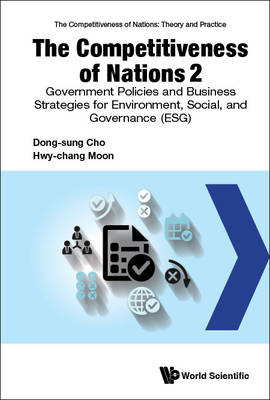
Je cadeautjes zeker op tijd in huis hebben voor de feestdagen? Kom langs in onze winkels en vind het perfecte geschenk!
- Afhalen na 1 uur in een winkel met voorraad
- Gratis thuislevering in België vanaf € 30
- Ruim aanbod met 7 miljoen producten
Je cadeautjes zeker op tijd in huis hebben voor de feestdagen? Kom langs in onze winkels en vind het perfecte geschenk!
- Afhalen na 1 uur in een winkel met voorraad
- Gratis thuislevering in België vanaf € 30
- Ruim aanbod met 7 miljoen producten
Zoeken
Competitiveness of Nations 2, The: Government Policies and Business Strategies for Environmental, Social, and Governance (Esg)
Dong-Sung Cho, Hwy-Chang Moon
Hardcover | Engels
€ 212,45
+ 424 punten
Omschrijving
As countries around the world seek to enhance their economies while facing the challenges of climate change and income inequality, national competitiveness is an important marker of the related strengths and weaknesses that policymakers will need to address. Among the existing reports on national competitiveness and rankings, such as IMD World Competitiveness Yearbook and WEF Global Competitiveness Report, there are sizable discrepancies in the ranking order for the same countries. As a result, confusion arises as such an outcome creates difficulties for government officials when translating these findings into real-world policies.The reality is that these discrepancies are due to the differences in logic and analytical models used by IMD and WEF. Therefore, in recognizing such problems and limitations, The Competitiveness of Nations 2 presents the IPS model as a new approach. Building on from Michael Porter's diamond model, it demonstrates a robust set of methodologies as well as offers several key policy implications for economies around the world that wish to enhance their competitiveness.The analytical tools used in this book can be further utilized for other units of analysis such as industries and individual firms. As this book provides a series of sophisticated methodologies and specific guidelines for enhancing national competitiveness, both academics and practitioners can derive useful implications.This annual book series was launched in 2021 and has included timely topics and in-depth discussion on national competitiveness. The first edition dealt with the COVID-19 global pandemic and the US-China trade war as its key focus. For this second edition, the Environmental, Social, and Governance (ESG) issue has been selected given its growing impact on strategic decision-making at both firm and country levels for sustainable competitiveness. This edition explores the development of ESG in various regions including Asia (Japan, Korea, India), Europe (Russia), Latin America (Peru), and Africa (Sub-Saharan Africa). It addresses how firms can contribute to ESG, and what governments should do to incentivize or regulate firms' engagement in its practices.
Specificaties
Betrokkenen
- Auteur(s):
- Uitgeverij:
Inhoud
- Aantal bladzijden:
- 400
- Taal:
- Engels
Eigenschappen
- Productcode (EAN):
- 9789811268083
- Verschijningsdatum:
- 28/06/2023
- Uitvoering:
- Hardcover
- Formaat:
- Genaaid
- Afmetingen:
- 152 mm x 229 mm
- Gewicht:
- 698 g

Alleen bij Standaard Boekhandel
+ 424 punten op je klantenkaart van Standaard Boekhandel
Beoordelingen
We publiceren alleen reviews die voldoen aan de voorwaarden voor reviews. Bekijk onze voorwaarden voor reviews.









